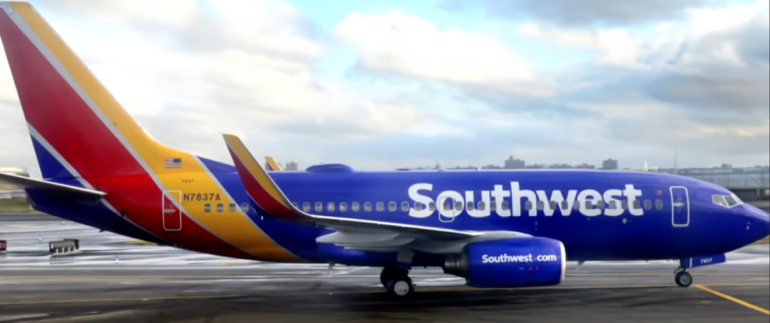A different experience?
Screenshot by ZDNet
Planes are reemerging from their desert vacations.
Pilots are being recalled. (Delta, for example, is reactivating all of its pilots.)
Airlines believe that the great new travel takeoff is about to occur.
Why, Southwest Airlines has just ordered 100 new Boeing 737 Max planes. (I have a feeling the airline got a very good deal.)
Sadly, though, not everything is returning to the artistry of what used to be called normal.
Recently, Southwest made another announcement that may make a few passengers wonder where customer service might be headed.
The airline is reintroducing soft drinks on its flights. It would, however, very much like passengers to, well, keep quiet while they’re ordering drinks. The technical term the airline is using, The Points Guy reported, is “non-verbal ordering.”
Ideally, the airline wants you to go to its inflight wifi portal and carefully zoom into the drink you desire. And then, presumably, point to it as if you’re doing the old safety demonstration. An alternative — perhaps for flights where there’s no Wi-Fi — is for the flight attendant to hold up a card with numbered pictures of the drinks. To which the passenger holds up the appropriate number of fingers.
COVID-19 is, of course, at the heart of this move.
The airline offered: “Customers are expressing a preference for additional beverage options, so this is one small way that we can meet Customer requests while still limiting selections to support the wellbeing and comfort of our Customers and Employees.”
The words are, of course, understandable.
Presumably, silent ordering cuts down on your inner droplets being emitted into the outside air. Yet airlines have been boasting about their cabin air being among the purest and most breathable forms of air there is.
Sample: “All of our aircraft are equipped with High-Efficiency Particulate Air (HEPA) filters, which remove 99.97% of airborne particles, similar to technology found in hospitals.”
Or: “Our aircraft are designed with an air circulation system that mixes in fresh air from outside the plane with air inside the plane.”
Yes, these are both from Southwest.
Most airlines also packed their middle seats as soon as they could, with United insisting such closeness was absolutely fine.
Still, perhaps you can never be too careful and it can be harder to hear others when they’re wearing a mask — or to make yourself understood when you’re wearing one. Moreover, for those who have difficulties with speech, language, or hearing, this new process will be entirely helpful. Even if it won’t be so helpful for the visually impaired.
Yet, still I worry.
For some passengers, any amount of normal human contact with a flight attendant can add to the experience. Especially on an airline like Southwest, which is renowned for its human-friendly service attitude.
If it will all now be a performance of pointing and nodding, perhaps some of that humanity will be lost.
And what happens when the drinks are served? Will a Carmelite silence descend?
Moreover, the “non-verbal” ordering method puts the onus on passengers to open their phones, scroll, and be ready to point. Southwest, after all, has no seatback screens — which some airlines have used to facilitate drink ordering.
So, just as the likes of American Airlines are increasingly relying on passengers to use their own gadgets for entertainment, Southwest would now prefer passengers to use those gadgets to order drinks.
more Technically Incorrect
And what, I hear you cry, if all you have is an iPhone SE? There will be pointing and squinting and nodding and more squinting. And wait, some will surely say, isn’t everyone supposed to be wearing a mask anyway? So is this silent, gadget-based ordering truly necessary?
Southwest isn’t alone in wondering whether in-air customer interactions should change. United Airlines flight attendants believe that offering on-board snacks and alcoholic drinks is causing a “toxic environment.”
Worse, they say, United’s sales software is deeply imperfect and enforcing mask compliance is becoming increasingly difficult.
Sometimes, it’s hard to know whether every COVID-inspired, technology-enabled move is there to make passengers feel better or whether the balance of benefit is tilted toward the airlines.
American Airlines, for example, recently announced that — perhaps very soon — you won’t even need your phone to check-in, drop off your bags and board a plane. Everything will be dependent on facial recognition.
The pandemic is the driver or excuse, depending on your perspective. But the effect will surely be for the airlines to employ fewer people, for there to be less natural human contact between airline staff and customers, and for customers to worry where their most intimate personal data is flying to next.
Of course, COVID-19 has necessarily created change that will last long after the pandemic subsides — and may even become permanent.
Perhaps one of those changes will be that customers expect (even) less humanity from airlines — and from so many other businesses which are increasingly becoming robotic — and disappear numbly into their devices the moment they board.
It’s the way of the world, perhaps. Somehow, though, it feels like a pity.
